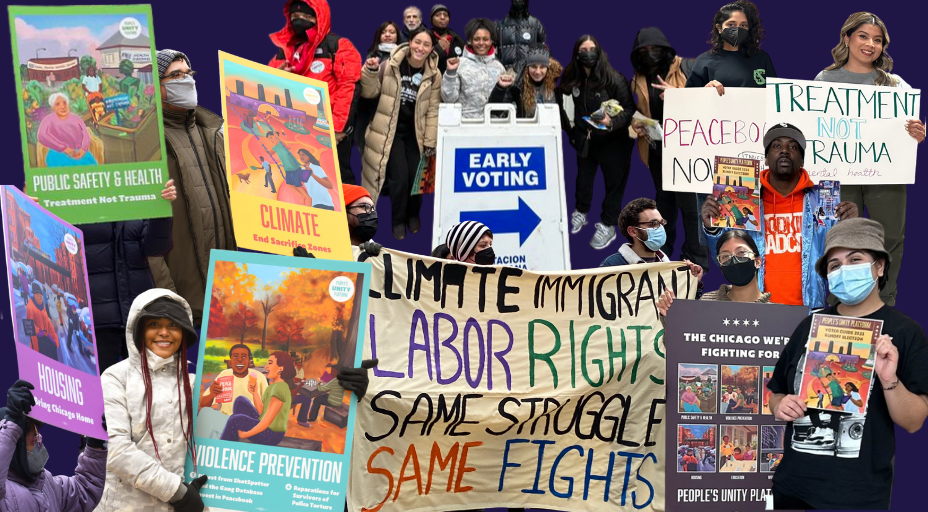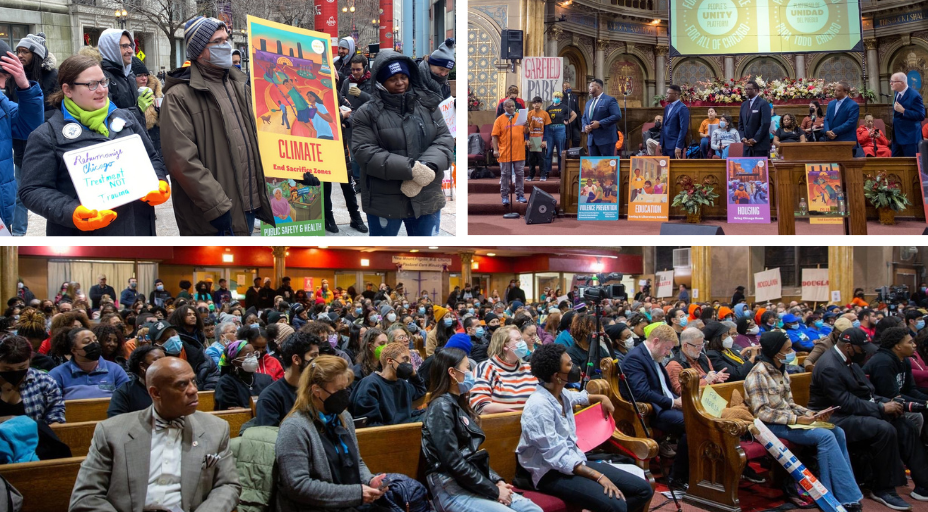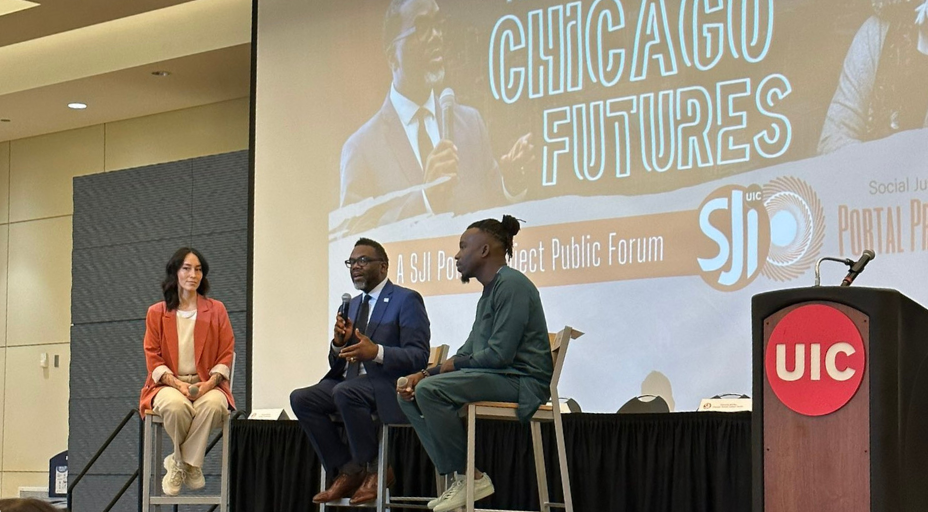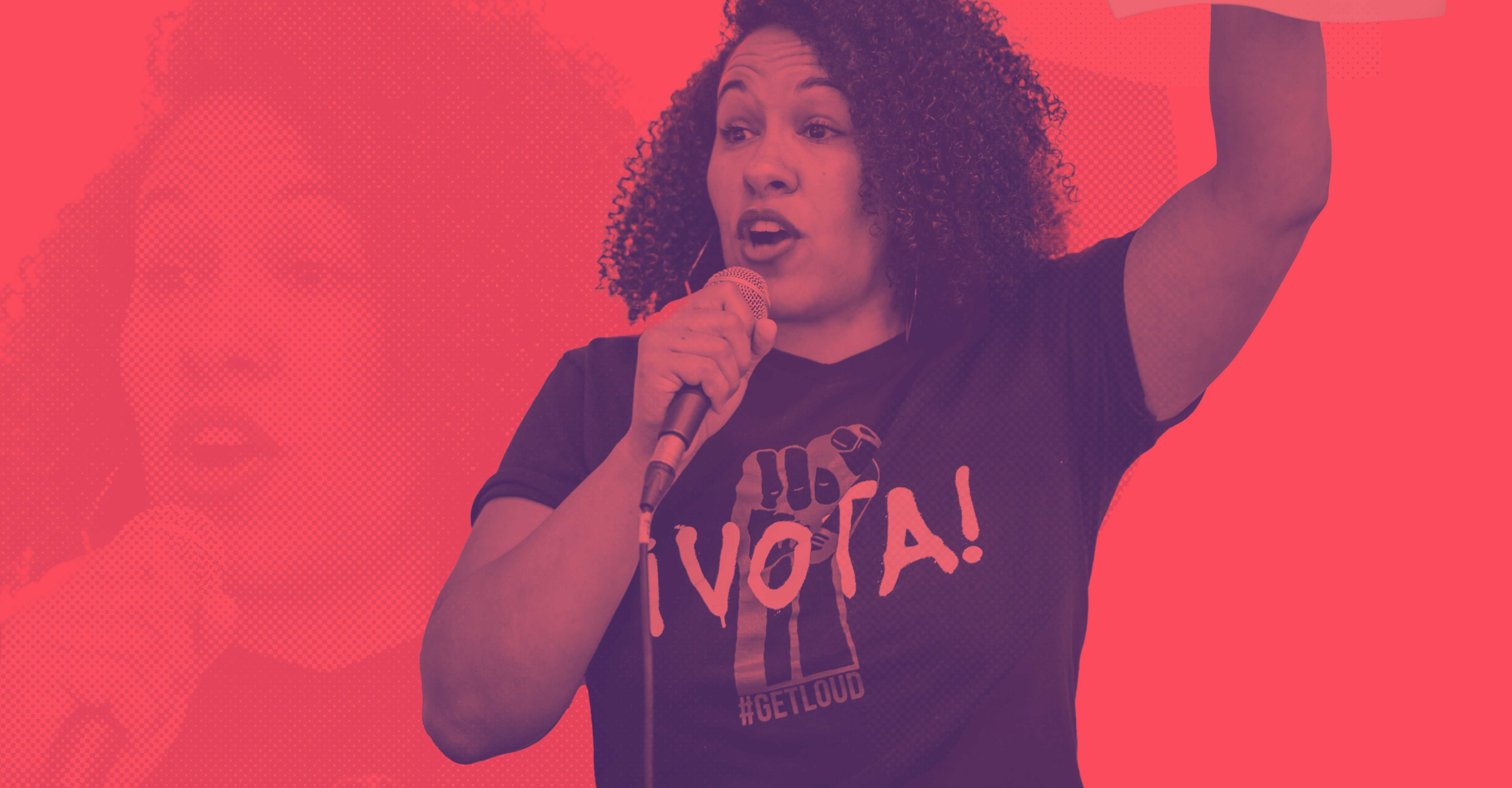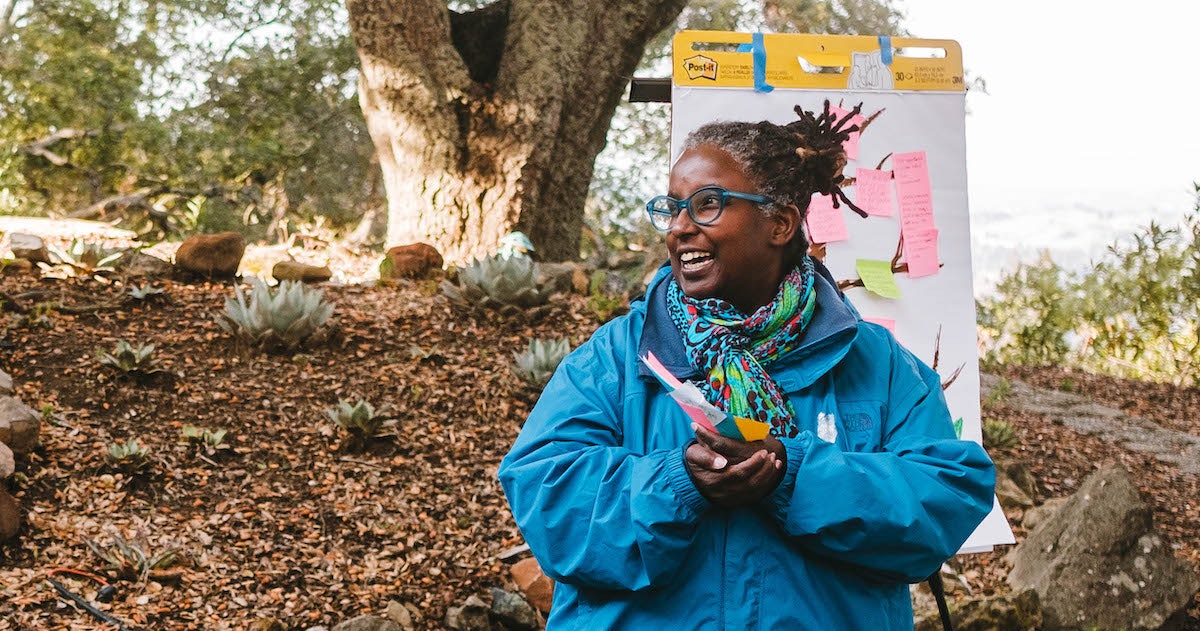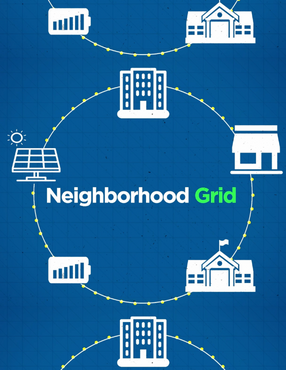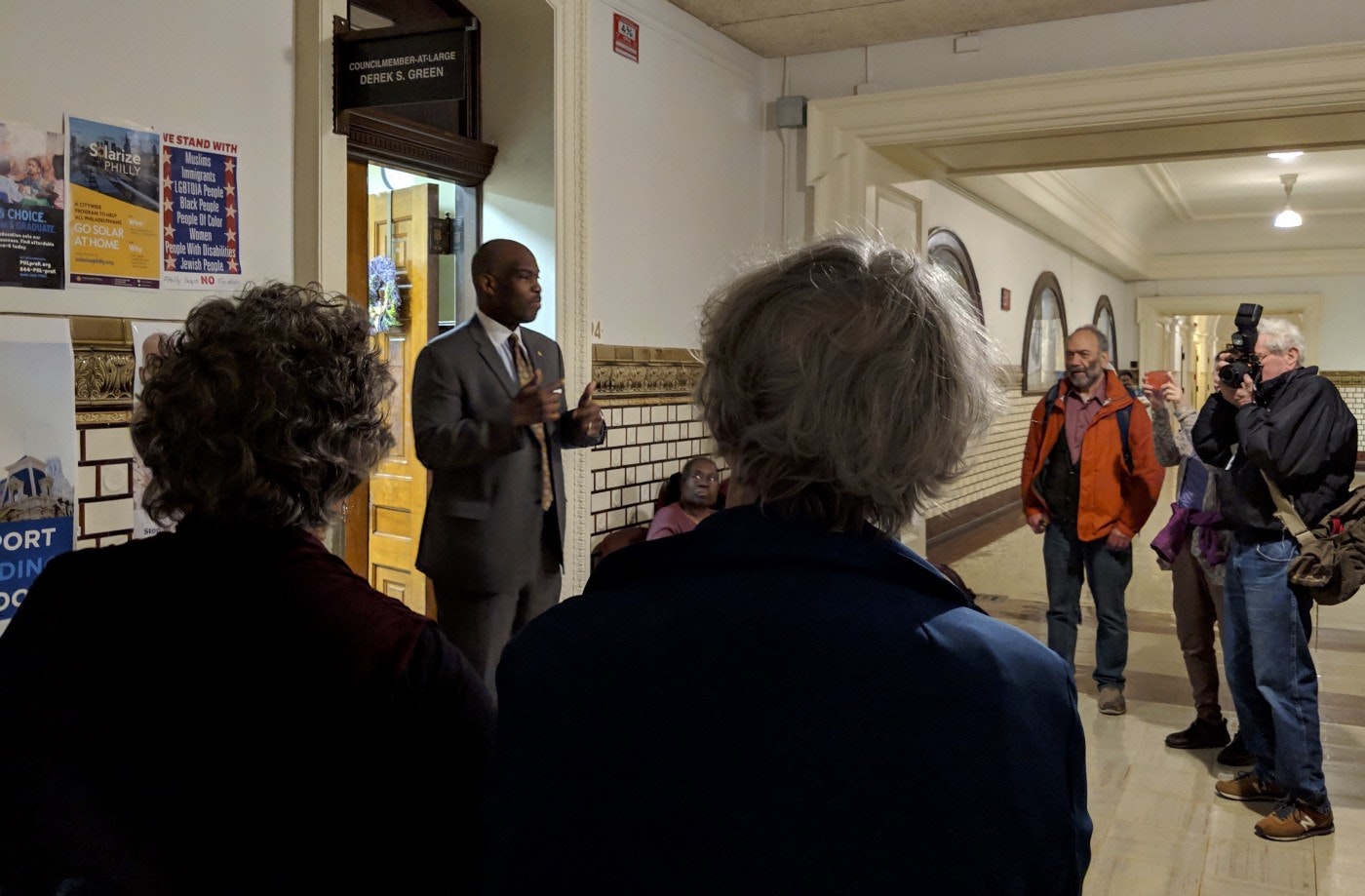Formed in 1997 as the driving force behind Chicago’s first living wage law, our Chicago affiliate Grassroots Collaborative (GC) has grown into a convener of coalitions — bringing together labor groups and community organizations, facilitating their political alignment, and uniting them in campaigns undergirded by shared values. GC has played a critical role in the 2012 Chicago Teachers Union strike, reforming the city’s Tax Increment Financing program, and two current, high-profile campaigns focused on mental health services and police violence (Treatment Not Trauma) and homelessness (Bring Chicago Home). Leading up to and following the historic election of Mayor Brandon Johnson, Grassroots Collaborative organized a coalition of more than 30 community and labor groups to drive these campaigns forward as they push and negotiate with the new administration around prioritizing community needs.
Our National Campaigns Director, Mariah Montgomery, spoke with Jung Yoon, Campaign Director at Grassroots Collaborative, about coalition organizing, co-governance, and how GC is planning for the years ahead.
Mariah: Can you take us back a few years and share how Grassroots Collaborative got to this moment—from the living wage campaign to the CTU strike to Treatment Not Trauma and organizing around the mayoral election?
Jung: Chicago is the home of neoliberalism. We have a strong legacy of austerity, of tax cuts for the wealthy, of program cuts to the things that our communities need. Some of the main issues that initially brought the 10 member organizations of Grassroots Collaborative together were around revenue, public spending, and taxation. For a couple of years we had a really anti-labor governor, Bruce Rauner, who tried to bust unions and make Illinois a right-to-work state. Then we had Mayor Rahm Emanuel, the King of Neoliberalism, who sought to privatize Chicago public schools and, at the same time, shut down 50 schools in poor, Black and Brown neighborhoods. That decision was met with huge resistance that sparked a movement of parents, students, educators, and community members who realized they had a common fight and a common enemy. That is part of what brought our organizations together and really drives our sense of the work: fighting strategic campaigns and funding our communities. Now, we’re entering a new phase where we’re thinking critically about how we choose our demands and how we shape our narrative.
Mariah: Can you say more about that fight against the school shutdowns and how it was tied not only to labor demands, but public investments and racial justice?
Jung: That was a really important, pivotal moment in the political development and strategy of the Chicago Teachers Union. CTU framed Chicago’s inequitable school spending as “Educational Apartheid,” bringing in a racial justice analysis that spoke to larger, systemic issues within the city.
While supporting CTU’s efforts, Grassroots Collaborative also brought in community groups and helped to develop collective political alignment around an alternative vision for Chicago schools. We were very clear that we needed to build political power. People were sick of not having any decision-making power over what was happening in their neighborhoods. The closing of schools was a really big turning point for the city, but there were other important moments around a variety of issues that led to an important shift away from reacting defensively, and towards demanding that the city invest more in its communities. That has informed the Treatment Not Trauma campaign, which has been years in the making and is finally getting the public recognition, support, and funding that it — and our communities — deserves.
Mariah: Treatment Not Trauma — the campaign to reopen closed public mental health clinics and offer non-police crisis responses — has had some big wins over the past few months! Can you tell us about how it got started, some of the challenges it’s faced, and where it stands now?
Jung: Back in 2012, in addition to closing those 50 public schools I mentioned earlier, Mayor Rahm Emanuel also closed six public mental health centers that were located in and around high-needs areas. It was honestly heartbreaking. Some of our most powerful, vocal leaders did not make it because they did not have the mental health services they needed when those clinics closed. That decision literally cost lives.
Since those closures, organizers, allies, and everyday people came together to create the Treatment Not Trauma campaign, which has two main demands: 1) reopen the public mental health clinics, and 2) create a non-police crisis response service so that when someone calls 911, a social worker or a mental health provider can respond instead of a police officer with a gun. We know that folks experiencing mental health crises are 16 times more likely to be shot by a police officer, and on top of that, Chicago has a horrific track record of police murders. It felt really important to bring those two issues together.
The campaign has definitely faced its fair share of challenges. We tried to get an ordinance passed under Mayor Lori Lightfoot’s (the successor to Rahm Emanuel) administration, but she refused to bring it to a vote. Eventually, a couple of budget cycles ago, we were able to win a small pilot program that funded alternatives to the police response model. Even then we were going up against a narrative that said: “Black communities don't want this. They want police. Latino neighborhoods don't want this. They want more cops.” There’s also a narrative that people with mental health crises are dangerous, and therefore a cop needs to respond to a call. So, together with the coalition, United Working Families (a political recruiting and training organization that our affiliated 501c4, Grassroots Illinois Action, helped to establish), and other partner groups, we set out to prove that those narratives were false. We conducted surveys, ran petitions, and ran a non-binding referendum in three key wards (electoral districts in the city—there are 50 total, each with their own representative alderperson) with the highest number of mental health calls. That referendum appeared on the November 2022 ballot and more than 96% of folks in all three wards voted “Yes” to reopen the mental health clinics and fund a non-police crisis response model.
Mariah: That’s so exciting! Treatment Not Trauma also showed up in the recent mayoral election and is still building momentum now. Can you share how Grassroots Collaborative shifted the narrative around the campaign and made it a priority for the current administration?
Jung: Last year we started the People's Unity Platform, a citywide coalition united around building true safety through things like housing, environmental justice, education—not police. We knew and very much anticipated that the narrative of the election would be about crime and violence, so we needed to create an alternative narrative. We started the coalition as a way to center our issues so that every candidate had to talk about them on the campaign trail. That's exactly what happened with Treatment Not Trauma and Bring Chicago Home, our campaign to create permanently affordable housing for folks experiencing homelessness. We were able to shift the narrative around a root cause approach.
Now, we have a mayor who is committed to Treatment Not Trauma. At last month’s budget address, he announced a huge win for the campaign: reopening two mental health centers and expanding the non-police crisis response model, moving it out of the pilot phase and making it an official program in the city. And earlier this month, the City Council passed Bring Chicago Home, which means it will be on the March 2024 ballot for voters to decide!
It took a lot of organizing and alliance building to make that happen. I think that's what GC does best: thinking ahead about our circumstances, how we change them, and ways we can build a coalition that is a united front and can work together on a variety of different issues with a common thread.
Mariah: Coalition organizing can be really challenging—what was that process like, both in the context of this campaign and in general?
Jung: It's very true that you move at the speed of trust. We had more than 30 organizations in the coalition, all with their own unique demands, and we knew that we had to unite around only five or six. We facilitated a lengthy alignment process — we walked through political arguments, campaign plans, pathways to win, legislative language, base building tactics, and many other elements. Then we held a vote. Because people had gone through this political alignment process, they weren't mad if their issue wasn't a marquee demand. They understood why. Everybody was bought in and agreed that these were the demands to align behind for the purposes of this election.
Then Mayor Johnson adopted most of those things once he won office, and it becomes a question of: what do we win next? How do we sequence out these fights? We need to do similar processes over and over again, really understanding timelines and opportunities. It's been a good space for collective analysis, information sharing, trust building, and active solidarity. Our goal is to build deep trust with labor and community, and facilitate that political alignment process through campaigns, popular education, and political education. We’ve also been doing this for a while, so I think people trust us and want to participate and figure things out together.
Mariah: I want to go back to what you said about entering a new phase of making demands, changing narratives, and even co-governing with a more favorable administration. Can you say more about what that's like and what's exciting about it?
Jung: The momentum is definitely building and for the first time we are flexing our governing power. But the everyday people of Chicago have inherited an institution that was never made for us. I interviewed Mayor Johnson for a panel right after he got elected and I asked, "What does co-governance mean to you?" And he answered, "Well, it's not that deep. Our city's been co-governing for a long time, just with rich people and businesses." And that’s true. The co-governing we’re talking about is with communities and everyday people. That requires us to organize our people and the administration to think differently. We have to level up and think about not just what we need, but also our plan to get there. Now that we have political power, we have to negotiate and think through where does that money go? What does the program look like? What's the governance of that program? How do we build and expand it? How does this program create space for us to win bigger later on? We're forced to think in a more detailed, nuanced, and long term way.
Mariah: How is GC thinking about these long term demands and fights?
Jung: All of it relates to how we are building durable political power for the next decade and beyond, because the things we want and need are literally not possible in the next four years. So, what are the campaign stepping stones to get there? We’re also looking at the corporations that are causing our communities, our planet, and our democracy so much harm. Just because we have a favorable mayor in office doesn't mean that corporate interests and pressure go away. We're so used to focusing on the mayor. But who's actually still trying to buy the mayor off? That's who we need to call out. That's a shift that some people have experience with, but not everyone. If we want to fight—and win!—against austerity, neoliberalism, authoritarianism, and exploitation, then we have to take on the corporations that are extracting from our communities, poisoning our environment, and undermining our democracy. That's the next horizon and task.
